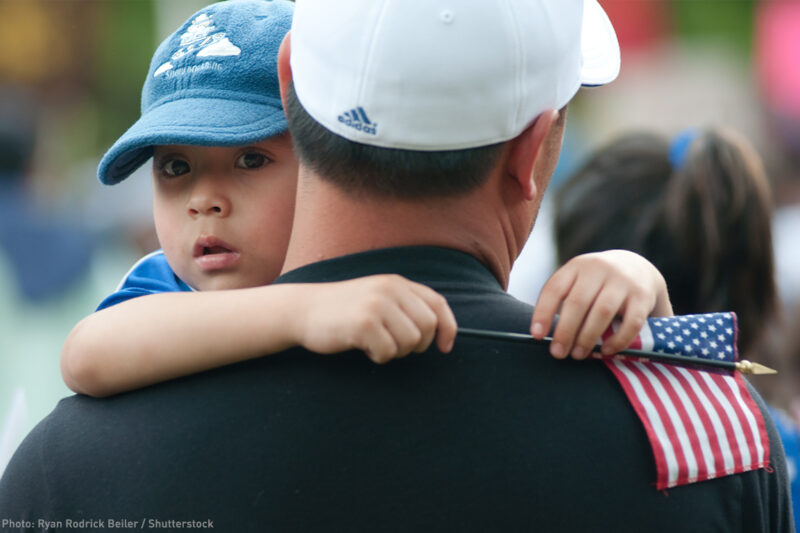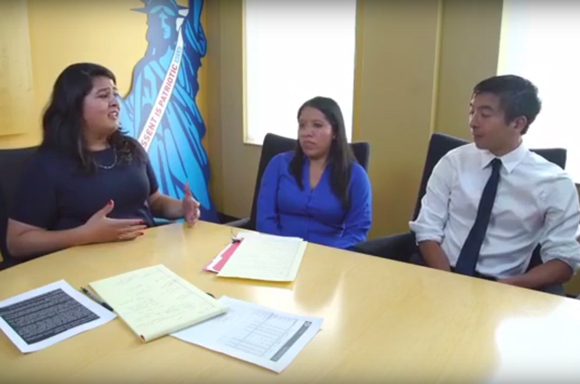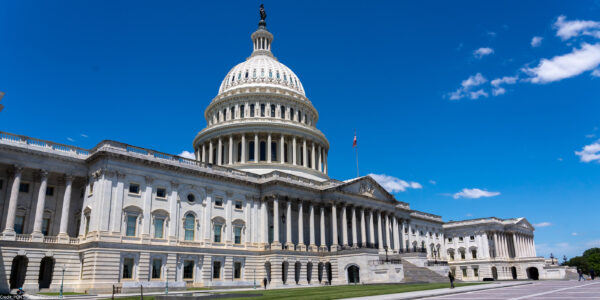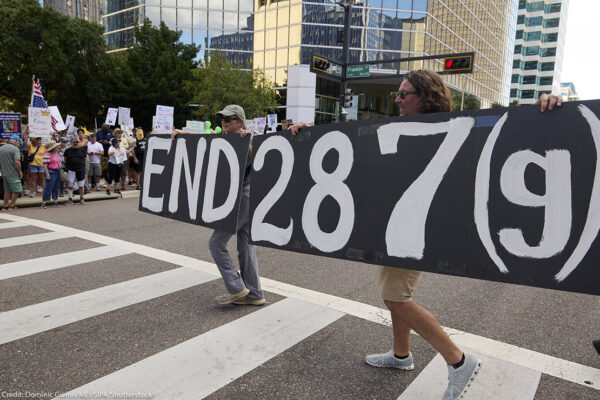
You asked, we answered. Last week was the fifth anniversary of the Deferred Action for Childhood Arrivals program that provides work permits and a temporary reprieve from deportation for almost 800,000 young people who came to the United States as children, are undocumented, and meet certain stringent conditions.
The Q&A below is taken from a Facebook Live featuring Jessica Colotl, a DACA recipient whose DACA was recently revoked by the Trump administration, only to be reinstated by a judge; Michael Tan, a staff attorney in ACLU’s Immigrants’ Rights Project and Jessica’s lawyer; and Lorella Praeli, ACLU’s director of immigration policy.
How can we protect DACA?
Lorella Praeli: I think, in a lot of ways, in order to talk about how to protect DACA, it’s important to tell the story of how DACA happened. DACA happened because people had the courage to come out of the shadows, even though they maybe would have faced the risk of deportation or they were exposing their lives and making themselves vulnerable. We decided to come out and tell our stories. We decided to organize. And for all of the young people watching, as young people ourselves, we decided that we had the agency and the knowledge and the ability to develop our own strategy, to use every tool at our disposal, to make sure that we built our movement and that we built our campaigns.


%3Ciframe%20allowfullscreen%3D%22%22%20frameborder%3D%220%22%20height%3D%22384%22%20src%3D%22https%3A%2F%2Fwww.youtube.com%2Fembed%2FDmn3rWHxO-I%3Fautoplay%3D1%26version%3D3%22%20thumb%3D%22%2Ffiles%2Fweb17-dacalive-580x384.jpg%22%20width%3D%22580%22%3E%3C%2Fiframe%3E
Privacy statement. This embed will serve content from youtube.com.
Lorella Praeli: And so when I came to D.C. in 2012, first in 2010, and all through 2011, there were people who were doing the work who had laid down the foundation. But we were still pushing space that didn’t think Dreamers had the right to be there, that didn’t think that young undocumented people could sit at the table and decide for themselves: This is the strategy, and this is the way that we’re going to go forwards. And so for all of you watching, really, when it comes to DACA, it is purely discretionary.
How does DACA change a recipient's situation?


%3Ciframe%20allowfullscreen%3D%22%22%20frameborder%3D%220%22%20height%3D%22384%22%20src%3D%22https%3A%2F%2Fwww.youtube.com%2Fembed%2FBxQon6SFUFg%3Fautoplay%3D1%26version%3D3%22%20thumb%3D%22%2Ffiles%2Fweb17-dacalive-580x384.jpg%22%20width%3D%22580%22%3E%3C%2Fiframe%3E
Privacy statement. This embed will serve content from youtube.com.
Jessica Colotl: I can now basically have the American Dream. I am able to work and live without fear. It’s a life-changing event when DACA happened. I went from not being able to work, not being able to drive, living in fear, not knowing what could potentially happen to me, how would my future unfold, to eventually having some sense of what I can do to help myself and how I could prepare better for the future. I came to the United States when I was 11 years, and I’ve been in the United States, and Georgia specifically, for over 18 years. That’s home to me. And once again, when DACA happened, I was just so blessed. And every time I think about it, I still feel goosebumps, when I knew that it was going to change the lives of many people like myself out there. People who in a way felt rejected by society. We were forthcoming and just happy to be part of a bigger community, as it should have been from the beginning.
Why don't undocumented people just do the right thing and get legal status?


%3Ciframe%20allowfullscreen%3D%22%22%20frameborder%3D%220%22%20height%3D%22384%22%20src%3D%22https%3A%2F%2Fwww.youtube.com%2Fembed%2FdXz1X6yhXgE%3Fautoplay%3D1%26version%3D3%22%20thumb%3D%22%2Ffiles%2Fweb17-dacalive-580x384.jpg%22%20width%3D%22580%22%3E%3C%2Fiframe%3E
Privacy statement. This embed will serve content from youtube.com.
Lorella Praeli: We always get this question, which is why can’t they just get in line, why can’t they get legal, or do the right thing? And the answer is the whole point of the Dream Act, the whole point of fighting for common sense immigration reform, is to create that line that people can jump on. My mom now has a green card for the last few months, but if my mom at any moment when she was undocumented was given an opportunity to get on a line and pay and provide the documentations to say that she’s been here and come forward, she would have done it in a heartbeat. So that’s what we’re fighting for here at the ACLU. That’s what so many of our partners have been fighting on for more than a decade. And we are going to need you all to continue that fight.
Are applications for DACA currently being approved? How many people have gotten approved in 2017?


%3Ciframe%20allowfullscreen%3D%22%22%20frameborder%3D%220%22%20height%3D%22384%22%20src%3D%22https%3A%2F%2Fwww.youtube.com%2Fembed%2FrvNr2Bni1yA%3Fautoplay%3D1%26version%3D3%22%20thumb%3D%22%2Ffiles%2Fweb17-dacalive-580x384.jpg%22%20width%3D%22580%22%3E%3C%2Fiframe%3E
Privacy statement. This embed will serve content from youtube.com.
Lorella Praeli: So in terms of our applications currently being approved, they are being approved, but we encourage you to be careful and to make sure that you have an attorney who is reviewing your applications. And in terms of whether or not they will be approved in 2018 or throughout 2017, all we know is that it’s being approved right now and the USCIS actually released new updated data from the last three months since Trump has been in office. We don’t know if they will be approved in 2018. If they’re not, we will make sure to let you know, as will other organizations. But for now, they are being approved.



